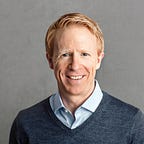Why I Questioned My Surgeon’s Advice. And Glad I Did.
How Amazon and the Medical Community Saved Me From a Surgeon’s Knife
The body is complex, mysterious even. Unlike the latest iPhone, open us up and we are not identical. Further, genetics and environmental factors play a still-uncertain role in our health. A game of chance. The insurance industry knows this, of course, and only attempts to estimate your life expectancy, not solve for the date of your death. But there are ways to tilt the odds.
So when I tweaked my knee while misjudging the distance stepping off a loading truck, I simply monitored my body’s response over the following weeks. After about a month of irritation I scheduled a consult with an orthopedic surgeon, a knife-wielding specialist in body mechanics.
The x-ray in the surgeon’s office revealed nothing. It was likely a meniscus tear, he said, and recommended a follow-up appointment for outpatient arthroscopic surgery. My surgeon would “scope” the area and repair any tear he may discover. No muss, no fuss. I would be back to full speed in no time.
Years prior I read Atul Gawande’s bestseller “Better: A Surgeon’s Notes on Performance,” an account of how the medical community can improve. Misdiagnoses, administrative errors, even botched surgical procedures all insert risk into the clinical fixing process. And I had personal experience with this risk, as lady luck had not been with me during my ACL reconstructive knee surgery. After the operation I woke up in the intensive care unit with a life-sustaining oxygen mask over my mouth, a necessary step due to my body’s unexpected reaction to the anesthesia that day.
These things happen. Life is a crapshoot.
So instead of jumping to investigative surgery based on an experienced hunch, I asked about an MRI. Short for Magnetic Resonance Imaging, an MRI is a wondrous piece of technology that uses magnetic fields to form images of your body. As a former US Navy nuclear engineer, educated on the hazards of radiation, I now avoid incremental exposure where possible. Even still, the MRI is safe. And for the price of an MRI I could buy more diagnostic information and avoid the “minimally invasive” prodding of this surgeon-consultant. Felt like a good risk.
My MRI suggestion caught this doctor off guard. The conversation took a different tone. Of course, he said, I always had the option of obtaining an MRI. However, he had seen this hundreds of times and through a scope could verify exactly what was happening inside my joint. Unconvinced, I scheduled the MRI appointment. No tears or abnormalities were discovered.
I now had a small sense of intellectual relief, though it did not address my physical problem.
So I turned to Amazon. Based on reader recommendations I ordered “Heal Your Knees: How to Prevent Knee Surgery and What to Do If You Need It” by Dr. Robert Klapper and Lynda Huey, and “Treat Your Own Knees: Simple Exercises to Build Strength, Flexibility, Responsiveness and Endurance” by Jim Johnson.
After reading both cover to cover, and diving into knee anatomy, I concluded some combination of the physical jolt and a change to my exercise regimen thereafter could have resulted in muscle misalignment and irritation (i.e. pain). The books discussed a range of knee exercises, some of which I continue to this day. My pain was gone within a few weeks.
The medical community is blessed with a “do no harm” culture. No doubt the doctor was doing his best based on years of pattern recognition, a that habit serves us all well. (See my review of Duhigg’s bestseller, “The Power of Habits: Why We Do What We Do in Life and Business” here.) Even still, the body is complex. Closer to your health history than anyone else, engaged consumers can be better patients. Even if that leads to questioning the recommendation of your well intentioned, highly trained medical professional.
Thanks for reading. Comments and suggestions for other topics welcome.
HSA Coach. Health is WealthTM
Our personal health document storage and health savings account (HSA) educational app is now available. App Store here. Google Play here.
